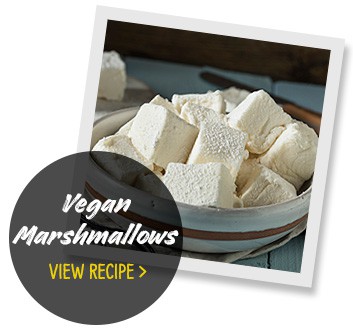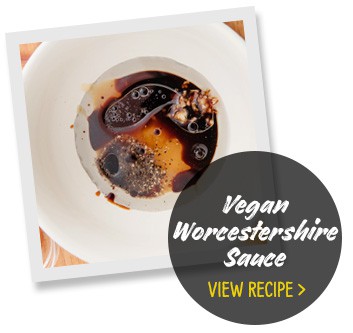If you’re new to veganism, avoiding animal-based products might seem fairly straightforward. However, there are a few things you’ll want to pay special attention to. We’ll help you navigate through these ingredient lists so you can steer clear of some potential hidden animal products that may surprise you.
Whey
Often used in baked goods, whey is one of those words you may or may not be familiar with—it’s the watery part of milk that is leftover after curds are formed in the cheese-making process. Because whey contains much of the lactose and about 20% of the protein in milk, it has become a valued byproduct. (It used to be something that got thrown away!) Whey powder is a mainstay in many non-vegan protein powders. Combined with other ingredients in processed foods, whey conveys a host of desirable properties—for this reason, you might find it listed in the ingredients for baked goods, beverages, dressings and a myriad of other products.
Casein
Another milk-based protein is casein. One of the two primary proteins in milk, it accounts for 80% of the protein in cow’s milk. You may also see casein in the ingredient list as caseinate or lactic acid which sometimes contains casein. Some foods where you might also see casein listed are margarine, non-dairy coffee creamer, cheese-flavored chips and snack crackers, as well as baked goods.
 Gelatin
Gelatin
Created from the skin, bones and connective tissues of (typically) cows and pigs, gelatin can be found in things like candy (think gummy bears), gum, capsules used for supplements and marshmallows. A vegan substitute for gelatin is agar-agar. A flavorless gelling agent, agar-agar is derived from cooked and pressed seaweed.
Whether you want to gather ‘round a campfire and roast marshmallows, or just sneak a few from the pantry (we won’t tell) you can try this
Vegan Marshmallow recipe—you’re friends and family will love them!
Natural and Artificial Flavorings
You might want to err on the side of caution with this phrase when you encounter it in an ingredient list as it can be either animal- or vegetable-sourced. Listed in the FDA’s
Code of Federal Regulations Title 21, natural and artificial flavors are both described as able to include “meat, seafood, poultry, eggs, dairy products, or fermentation products thereof”—a pretty wide window!
Vitamins and Supplements
Vitamins and supplements are a part of many people’s healthy living journey. As a vegan, you’ll want to pay a little more attention to the labeling. Found in many multivitamins, vitamins A, D and B
12 can be derived from animal products. Additionally, many supplements come in capsule format, which may be made of gelatin. When shopping for vitamins and supplements, it’s best to check the label and look for those that are labeled as vegan.
 Worcestershire Sauce
Worcestershire Sauce
Worcestershire sauce seems to show up in loads of recipes that you may want to convert to your new plant-based diet. The ingredient that will kick this condiment from your fridge, however, is anchovies. But fret not—here is a
vegan version you can whip up in no time!
Beer and Wine
It might come as a surprise that some wines and beers may not be vegan. After all, wine is made from grapes, and beer from hops and barley—all plants! Yet, some beers and wines might be made with non-vegan-friendly ingredients like dairy or honey. There is also the question of process: Animal products are often used in the filtering and fining, or clarification process of both wine and beer making. These include things like isinglass (from fish), sea shells, albumen (egg whites) and gelatin. Luckily,
this website contains a comprehensive list of well over 35,000 beer, wine and spirits, showing whether they’re vegan-friendly or not.
Carmine
A naturally sourced red dye used in food and drink, the most surprising thing about carmine is its source—a bug! For centuries, red dye has been created from the cochineal bug that lives on the pads of prickly pear cacti. Rich in history, this bug-centric colorant eventually made its way into modern-day food production. Some other names you might also see carmine listed as include cochineal, carmine lake or natural red 4.
Did you know? Broccoli, bok choy, chinese cabbage, collards and kale are all great, non-dairy sources of calcium.

 VIEW ALL
VIEW ALL





